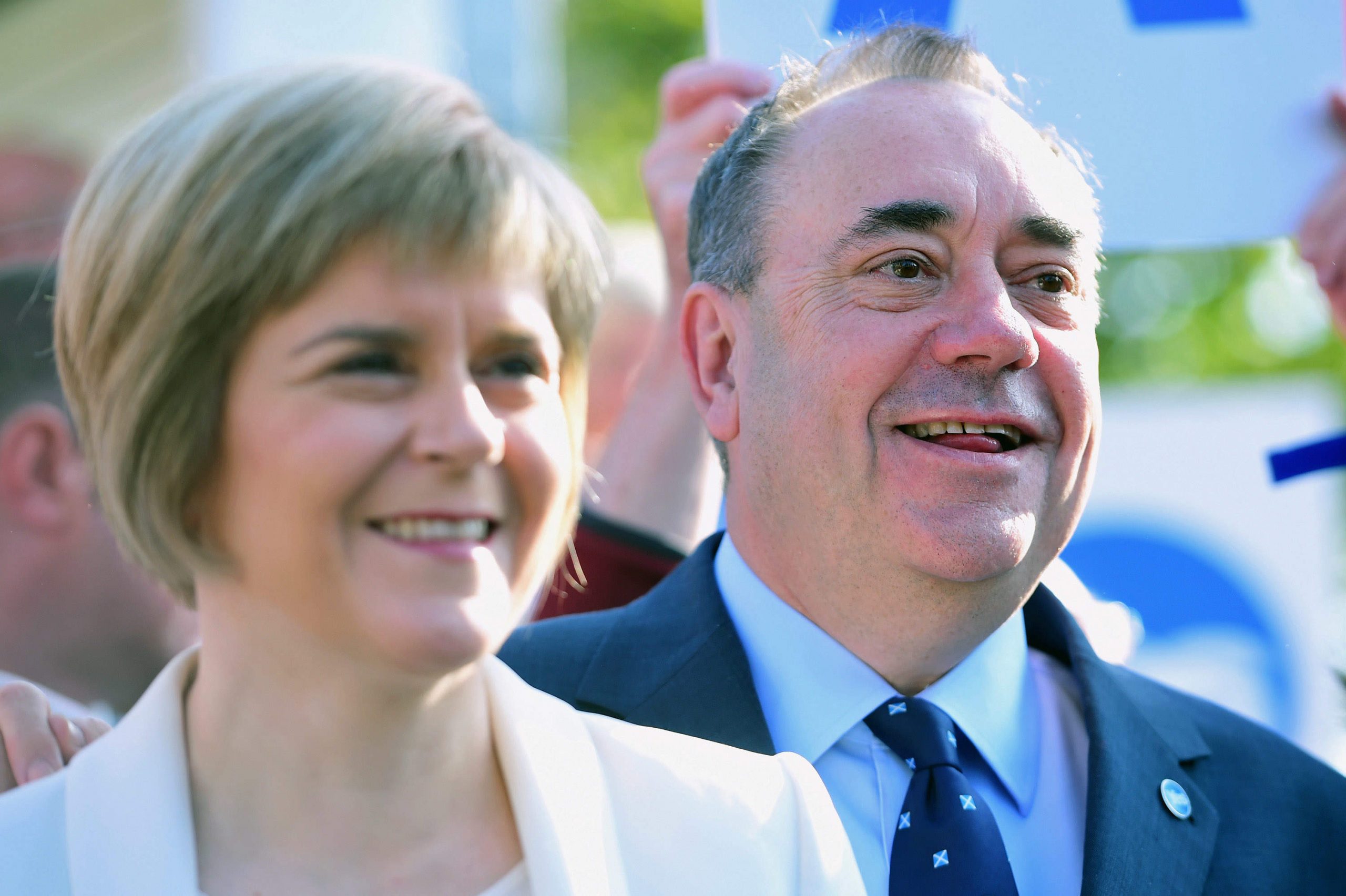
On the morning of 12 May I visited Portcullis House in Westminster to see who might be around. The first MP I met was none other than a very cheerful Alex Salmond, who had just discovered that his new office overlooked the Treasury: “I can keep an eye on them from there.” He said that he would naturally have preferred a “balanced parliament – as you would”. And he asked for 50 copies of our recent issue in which, in one of David Young’s cover illustrations, he was featured alongside Nicola Sturgeon as they rode the Flying Scotsman south. The train was hurtling towards Ed Miliband and David Cameron, both prostrate and tied to the track, resigned to their fate.

Cover image by David Young.
****
A few of our readers complained we’d made the mistake of equating Scotland with the SNP. That wasn’t our intention. But whether Westminster likes it or not, the SNP has arrived en masse, the largest grouping of nationalist MPs in London since the early 20th century, when the Irish Parliamentary Party enabled Asquith’s reforming Liberal government to hold power after the December 1910 general election. Their presence adds a fascinating dimension to the new parliament and will be a daily rebuke to a shattered Labour. The wipeout of Labour in Scotland, though it was not unexpected, has left the party understandably traumatised. “We did everything we knew locally but the national wave was just too strong,” one defeated Scottish MP said to me.
In the SNP landslide Labour lost two of its most intelligent MPs – Douglas Alexander and Gregg McClymont – and, in Jim Murphy, one of its toughest street fighters. Murphy will continue for now as leader of Scottish Labour. He ought to ignore the bullying of the Unite leader, Len McCluskey, who has called for his resignation and gives the impression of preferring the futilities of opposition to power.
The forces powering Scottish nationalism are varied – deindustrialisation, the fracturing of cross-border class solidarity, the decline of trade unionism, the rise of identity politics, and so on. Yet, in spite of all this, as I have written before, the Labour leadership in London was complacent about the events unfolding in Scotland and was unable to respond until it was too late.
Perhaps arrogance and a sense of entitlement blinded Labour to the seriousness of the nationalist surge. I’m a frequent visitor – my oldest friend is an academic at Glasgow University – and it was obvious to me, even as an Englishman, that Labour was destined to lose the 2011 Scottish election – as it did, badly, creating the circumstances in which an independence referendum could be held. There was little Labour could do to resist the torrential surge in support for the SNP in 2015; there was much it could and should have done to thwart the nationalist victory in 2011.
Now activists to whom I have spoken are seriously asking if Labour can ever win again in Scotland. Back in the 1980s when the party was weak it was still strong in Scotland. Today it faces a dual challenge: of trying to win in Scotland, where the SNP has positioned itself to the left and campaigned as an anti-austerity party, as well as south of the Severn-Wash line where, excluding London, it holds only 11 of 197 seats. Deep is the grave in which . . .
****
The New York-resident David Miliband has moved quickly to say what his younger brother got wrong – he mentioned “aspiration and inclusion” and said that Ed had given the impression the party was going “backwards” under him. When asked by a BBC interviewer about their relationship, David said, his eyes cold and dark, that they “were in touch”, no more or less than that.
Also on Tuesday David tweeted a link to a column by the New York Times writer David Brooks, the paper’s resident conservative. Brooks is interested in ideas and social trends, and uses data intelligently to support his arguments. Like many conservatives, he was intrigued by the Tory election victory and asked why after the financial crisis and the consequent Great Recession – especially considering the “unpopularity of the right’s stances on social issues and immigration” – the world had not turned left. Ed Miliband wagered his entire leadership and election strategy on a belief – and it was no more than this – that the electorate was yearning for a more egalitarian society and a return to socialism. Voters were certainly disturbed by widening inequality but just as important were a desire for fiscal rectitude and balanced budgets.
Yet, according to Brooks, as well as people’s scepticism about the left, “there are a few things centre-right parties have done successfully”. They have championed “national identity”, they have been “basically sensible on fiscal policy” and they have not “overread their mandate”. He went on:
Globally, voters are disillusioned with large public institutions. They seem to want to reassert local control and their own particular nationalism (Scottish or anything else). But they also seem to want a slightly smaller public sector, strong welfare state reform and more open and vibrant labour markets as a path to prosperity.
So if, as Brooks suggests, we are entering a new era of pragmatic conservative rule how should Labour respond, if it is not to be locked out of power for the next decade?
So far, the leadership contenders putting themselves about in the aftermath of defeat have been muttering about “aspiration”, as if the act of articulation were simultaneously an act of redefinition – and of absolution. Meanwhile, in other news, Ed Miliband has gone on holiday to Ibiza.




